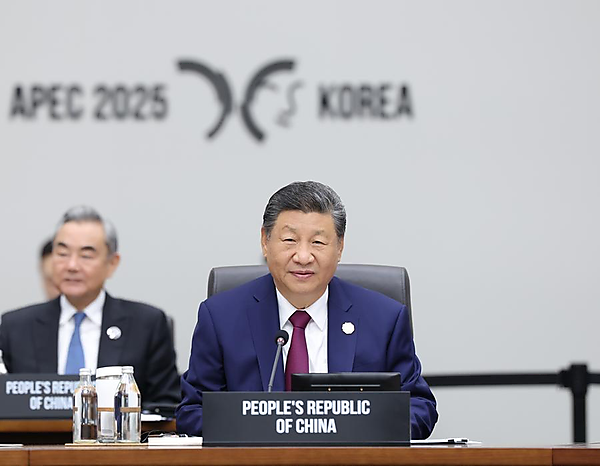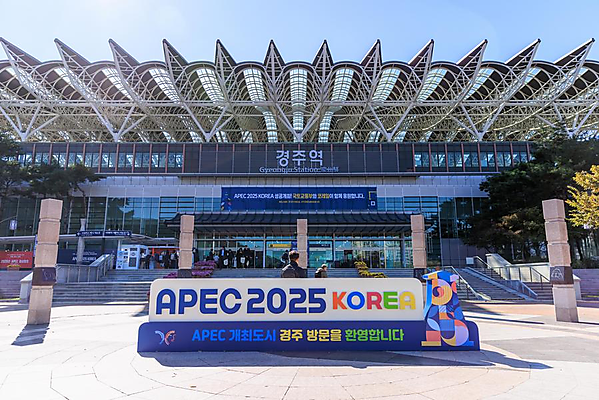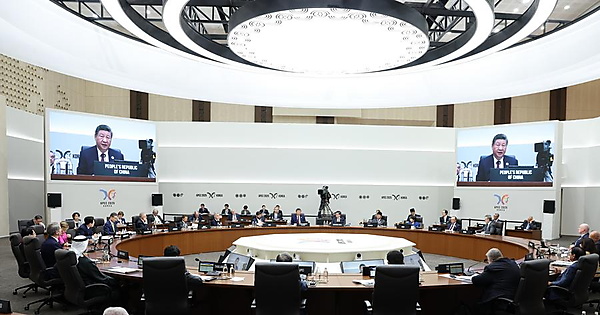 |
| Chinese President Xi Jinping attends the first session of the 32nd Asia-Pacific Economic Cooperation (APEC) Economic Leaders' Meeting and delivers a speech titled "Building an Inclusive Open Asia-Pacific Economy for All" in Gyeongju, South Korea, Oct. 31, 2025. [Xinhua/Huang Jingwen] |
In his APEC speech, Xi put forward a five-point proposal to promote a universally beneficial and inclusive economic globalization and to build an Asia-Pacific community.
GYEONGJU, South Korea, Oct. 31 (Xinhua) — Amid the hum of conversation and click of cameras, APEC leaders met here Friday to discuss the world economy. Taking the stage, Chinese President Xi Jinping sent a clear message: China will open its door wider and create new opportunities for the Asia-Pacific and the world at large.
Amid rising protectionism, Xi told the APEC audience that China always pursues the basic state policy of opening up and has taken real steps to promote an open world economy.
The Chinese president noted China's zero-tariff treatment on 100 percent tariff lines from the least developed countries having diplomatic relations with China, and pledged to extend the same treatment to all African countries maintaining such ties.
"China's door to the world will not close; it will only open wider and wider," Xi said.
This message resonated with observers. "This has sent a good signal to the rest of the world," said William Jones, an international relations expert and former White House correspondent for U.S. publication Executive Intelligence Review.
"It has also created enormous optimism in the Global South — the more trade and development they can have with China, the better," he added.
New Opportunities
Xi's South Korea tour is his first overseas trip after presiding over the fourth plenary session of the 20th Communist Party of China Central Committee, which adopted a landmark document — the Recommendations for Formulating the 15th Five-Year Plan — mapping out China's development path through 2030.
 |
| This photo taken on Oct. 28, 2025 shows a publicity installation of the 32nd Asia-Pacific Economic Cooperation (APEC) Economic Leaders' Meeting in Gyeongju, South Korea. [Photo by Park Jintaek/Xinhua] |
Reform and innovation are defining features of the plan. New initiatives, from strengthening indigenous innovation to rolling out an "AI Plus" initiative to empower industries, are expected to shape China's next stage of growth.
In a written speech to the APEC CEO Summit, Xi highlighted China's five-year plan, saying that China can provide the global business community with more growth opportunities, a good business environment, a vast platform for innovation, and conditions for green growth.
"Investing in China means investing in the future," Xi wrote.
Over the past five years, China has ranked as the world's largest trader in goods and the second largest in services. It has attracted more than 700 billion U.S. dollars in total foreign investment, and its outbound investment has increased by an average of over five percent annually.
Former Slovenian President Danilo Turk said that the long-term vision embedded in China's five-year plan brings stability to China's own development and to the world economy at large. "New and green technologies are moving to the center of China's development concept, which has a global impact," he added.
China's new energy vehicle output surged 35.2 percent year-on-year to more than 11.24 million units in the first nine months of 2025, while sales rose 34.9 percent to 11.23 million units, data from the China Association of Automobile Manufacturers showed.
Lee Hee-sup, secretary-general of the Trilateral Cooperation Secretariat, has also witnessed China's hi-tech and green transformation firsthand.
"During my visits across China, I have deeply felt that under the leadership of President Xi, the country is advancing national strategies focused on digitalization, artificial intelligence, green industries and scientific innovation, and vigorously developing new quality productive forces," Lee said.
These efforts are driving economic recovery and sustainable growth in China and beyond — and they are key to China's ability to lead future global development, he added.
Inclusive Asia-Pacific and Beyond
Xi's APEC speech marked his first public remarks following a widely watched meeting with U.S. President Donald Trump one day earlier in Busan, South Korea, during which he shared what he called an important secret behind China's success.
"Over the past seven decades and more, we have been working from generation to generation on the same blueprint to make it a reality," Xi told Trump. "We have no intention to challenge or supplant anyone. Our focus has always been on managing China's own affairs well, improving ourselves, and sharing development opportunities with all countries across the world."
In his APEC speech, Xi put forward a five-point proposal to promote a universally beneficial and inclusive economic globalization and to build an Asia-Pacific community.
 |
| Chinese President Xi Jinping attends the first session of the 32nd Asia-Pacific Economic Cooperation (APEC) Economic Leaders' Meeting and delivers a speech titled "Building an Inclusive Open Asia-Pacific Economy for All" in Gyeongju, South Korea, Oct. 31, 2025. [Xinhua/Huang Jingwen] |
The Chinese leader also voiced support for multilateralism and stressed the need to ensure stable supply chains.
"President Xi, in his speech, has laid out the most critical underpinnings that will drive economic progress in the Asia-Pacific region," said Lawrence Loh, professor of the National University of Singapore.
"Without adherence to the multilateral and open economic systems, it will be difficult to build a unified Asia-Pacific Community that will benefit the region and the world," he added.
Chairing Friday's meeting, South Korean President Lee Jae-myung also called for greater cooperation and solidarity among the region to overcome new challenges as the world is at a major turning point.
"We can join together for the ultimate goal of shared prosperity," Lee said.
Julia Roknifard, a senior lecturer at Taylor's University, said APEC has led the region to the forefront of global open development, helping make the Asia-Pacific the most dynamic region in the world economy.
"President Xi is correct in his observation that this region will continue to drive global economic activities for many decades to come," she said.
(Source: Xinhua)
Editor: Ye Shan